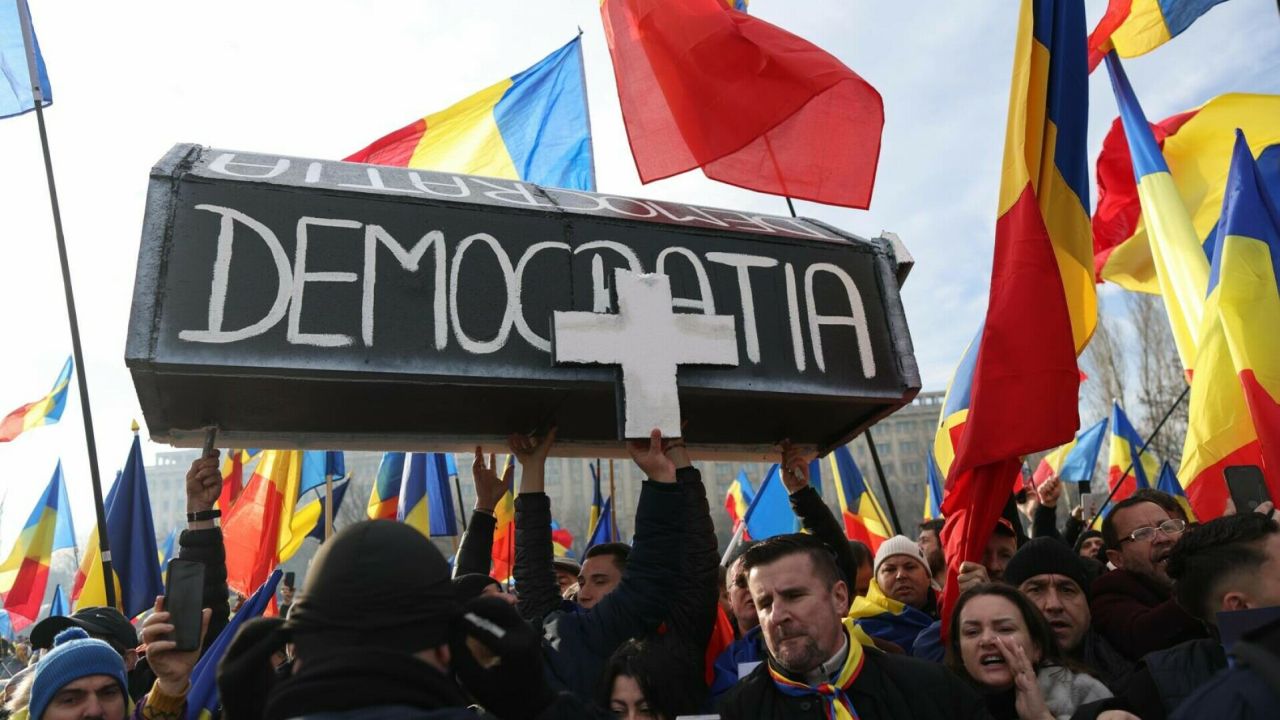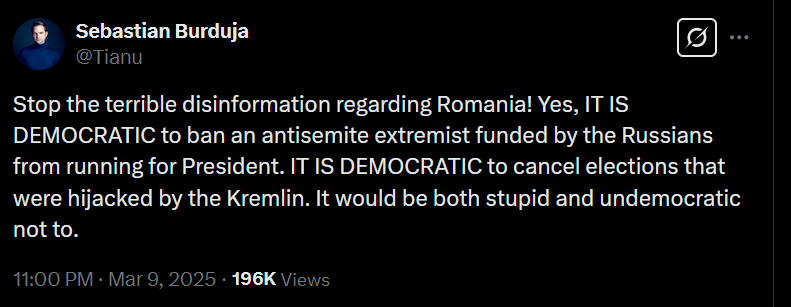One piece of news some of you might have missed is that Romania is now officially a hybrid regime. Not as bad as russia (yet) but as bad as Bosnia, Armenia, Georgia, Türkiye, Ukraine, Tunisia or Morocco.
This update from The Economist surprised absolutely nobody here. Even the Regime shills aren’t trying too hard to disprove it and instead resort to attacking The Economist itself because they list Hungary as better. Now, to be fair, that’s a good point as our Magyar neighbors are also running a hybrid regime. But that doesn’t change the fact that Romania is a hybrid regime which is categorized as having a combination of autocratic features with democratic ones and can simultaneously hold political repressions and regular elections.
So it’s on this backdrop that the last night’s announcement came on the candidacy of Călin Georgescu having been rejected. Sure, everyone on the real and fake dissident side pretends it’s shocked. It brings great social media clicks and sweet Twitter/X dollars.
The case
On legality, the procedure is as follows: One files for candidacy with the electoral central bureau (BEC – Biroul Electoral Central) and BEC evaluates if the procedure was accomplished (have the correct signatures, have the correct general paperwork and be eligible to run). These are the grounds on which BEC can reject a candidacy.
In the case of Georgescu, they relied on the latter – eligibility to run, effectively motivating that since the Constitutional Court annulled the whole process in December 2024 due to Georgescu’s irregularities and positions and ordered a rerun from the very beginning (new signatures, new campaign, new everything) then it follows that Georgescu’s candidacy runs the risk of a new annulment. You can read the whole thing here but the most important part is this:
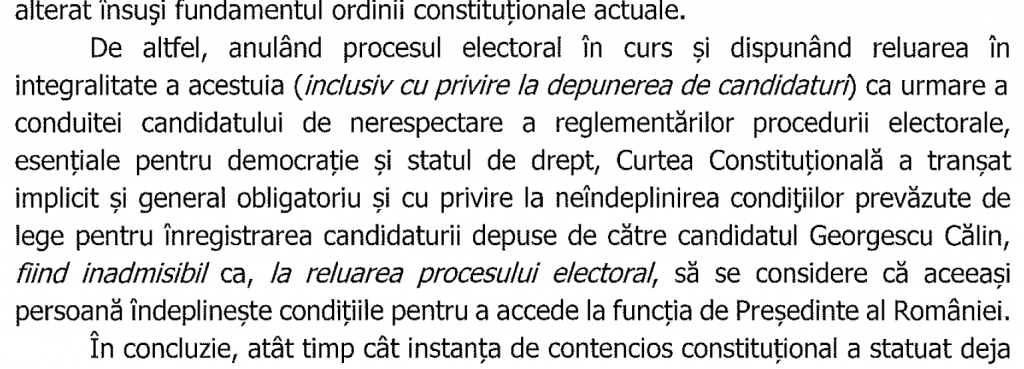
It’s a convoluted phrasing but it basically means: “We cancelled the election because of this guy so of course he’s ineligible for the rerun too.”
Strictly procedurally speaking, he can file an appeal to the decision but that appeal can only be filed at the Constitutional Court. That’d be the same Constitutional Court that annulled the election. So the likelihood of the Court having a change of heart is really, really, really low.
This is also due to a specific provision in the Constitution which specifies that the process for electing the President is explicitly subjected to censure only by the Constitutional Court. It’s why these kinds of shenanigans are unheard of in the general/legislative elections or the local elections – where censure is done by proper courts with a much higher standard of evidence.
To be fair to the Regime, this motivation, albeit crazy, is less crazy than the initial one – which was that some paperwork was not properly signed and some bureaucratic gobbledygook.
But then again: we all expected this. And, in many ways, it is in fact better that it happened last night rather than on March the 19th (which is the latest when the Constitutional Court can have opinions before we move to actual campaigning and printing the ballots).
Why it’s better now? Because there’s another deadline: March 15th, 11:59PM Eastern European Time (GMT+2). That’s the deadline until anyone can file for candidacy. Now that we know Georgescu is out, it leaves several options open (more on that soon).
Reactions
Of course, each according to his interest, had their reactions. The crypto scammer and Elon Musk’s pool boy, Mario Nawfal, was by far the most active in promoting the outrage. Of course, he has to since he got a decent amount of shekalim to shill for Georgescu.
Meanwhile, the Regime even pushed its own ministers (Sebastian Burduja is the minister of energy) to try to get is side of the story out – albeit with limited success. It doesn’t help when you unironically write that it is democratic to cancel elections.
The deputy prime minister of Italy, Matteo Salvini, called the decision a Soviet-style coup d’etat and argued that before considering ReArming Europe, maybe we should first re-found it to defend democracy.
The reason Matteo Salvini says this is because his party is not a big fan of the military but also because he wants to be noticed by JD Vance. There is also an electoral reason: his political party always polled poorly with Romanians (the largest minority in Italy) even though Romanians who can vote there did pull the lever for Giorgia Meloni (but also for Călin Georgescu as part of the overseas constituency vote).
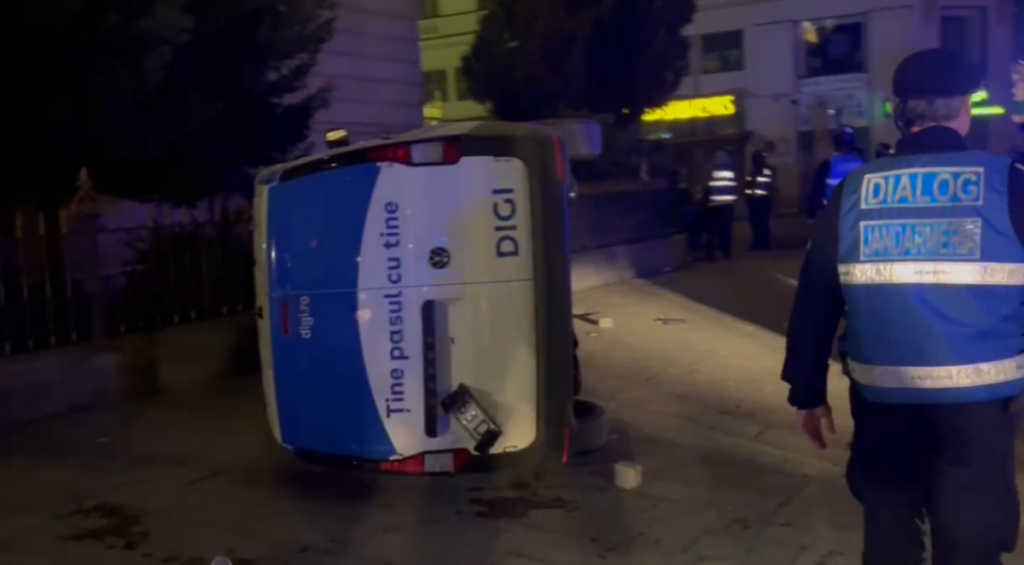 There were also some skirmishes in the Old Town (where also the HQ of the electoral bureau is located). Nothing too serious, contrary to the claims on X. The most spectacular (and the most well-deserved) part was the overturning of the car from the TV station Digi24. Those fuckers absolutely deserve it by default.
There were also some skirmishes in the Old Town (where also the HQ of the electoral bureau is located). Nothing too serious, contrary to the claims on X. The most spectacular (and the most well-deserved) part was the overturning of the car from the TV station Digi24. Those fuckers absolutely deserve it by default.
Imagine CNN during Obama but far worse in terms of ass-kissing for the Regime. Nobody is worse than them in shilling for the Regime and even other media people have started to adopt the dissidents’ nicknames for them – like PNL24 or UM Digi0024 (which is a portmanteau between their name and the naming convention for military facilities and it’s meant to emphasize that they’re part of the Mukhābarāt).
Much more interesting (and far more consequential both short term and long term) are the reactions from those who represent the future.

Older subscribers might remember Claudiu Năsui. Here’s him on the euro currency and cash payments 8 years ago on the Sofa. He remained in the westoid left party (USR) and even served as minister for the economy for a while during the Pandemic Project.
The thing is that he’s not alone in having this reaction. The president of his party, Elena Lasconi, also thinks similarly.
With very few exceptions, everyone with a voice and a modicum of influence that is younger than 50 that is not a fan of Călin Georgescu has also indicated disgust with the decision.
Heck, even the Regime’s candidate, Crin Antonescu (supported by the national liberals, the social democrats, the Hungarian minority’s party and some nominally non-governmental forces) also said he’d prefer Călin Georgescu runs and loses rather than fuel a conspiracy theory in the wider society. But, he said that 4 days ago. At the moment of this writing he hasn’t come out with a reaction. Probably because he’s sleeping (and I’m not even joking – the guy fell asleep on live TV 15 years ago and fell asleep during Parliamentary sessions routinely).
Meanwhile, George Simion (president of AUR/ECR which supports Georgescu) said that those responsible for this decision should be skinned alive in public. I agree with him, though for entirely different reasons. Like the majority of the country, idgaf about Georgescu at all, but purposefully harming bureaucrats generally speaking sounds like a good idea. Though I’m disappointed that nobody suggested the tried-and-tested Romanian method left to us as Tradition from Vlad Dracul III. To be fair, transversal impalement from Hungary also sounds pretty attractive. Okay, gore fantasy moment over.
On a more serious note, whether it takes 3 years or 7, the future does lie with PNL and PSD being replaced by (some version of) USR and AUR. At this point it’s a done deal. Just like it’s a done deal that the Constitutional Court will get reformed long before 2040. In which direction, that remains to be seen, of course.
A few words on the candidate
One thing young(er) people and most of non-systemic voices understand while the Regime doesn’t is that nearly all of the vote and support for Călin Georgescu is not for Călin Georgescu at all.
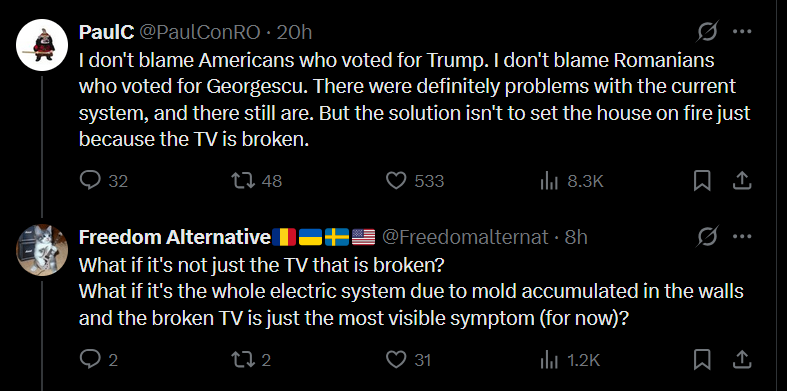 Slowly, but surely, even Regime inconspicuous shills are admitting this. Partly because they want some of the votes that may be up for grabs but also partly because damage control is the order of the day.
Slowly, but surely, even Regime inconspicuous shills are admitting this. Partly because they want some of the votes that may be up for grabs but also partly because damage control is the order of the day.
Ultimately though, this is too little and too late. We have a ~40% portion of the populace that thinks the whole system needs a boot in the teeth just because. And that part of the public will vote for anyone that can scare these fuckers. Georgescu scares them. It really is that simple.
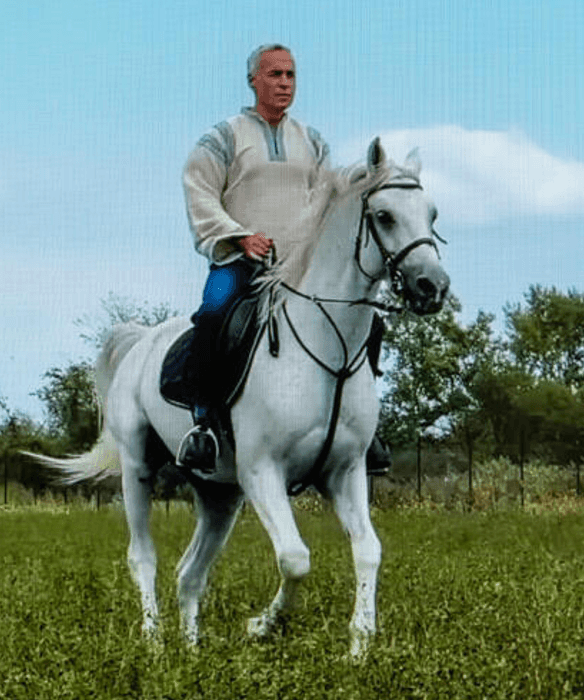
On the other hand, we have to keep in mind that Georgescu really is a loon. He has a horse fetish – the guy unironically said that the horse industry could reduce unemployment to zero. Please do keep in mind that unemployment is below EU average in Romania and in several industries there is in fact a labor shortage. But such facts are not particularly important for the philosophical space in which the Georgescu campaign is existing.
Ultimately, in addition to being a grifter, this guy is 62 and his formative years as a man were under Communism and his formative years as a politician were in the tumultuous 1990s when unemployment indeed was sky high. Boomers his age routinely do have factually wrong takes on the economy based on impressions that were at least partially true in the early 1990s. All countries have a cohort of people who are simply stuck somewhere in the past, mentally speaking. And Romania is no exception.
But again, that doesn’t explain his crazy electoral numbers and polling. Most of the vote did not (and would not have) come from people who agree with him on much.
This can very easily be observed in every single poll or by simply talking to his (potential) voters on the streets. It’s not hard to find them either.
The media’s frenzy isn’t bought by almost anyone. And of course it isn’t. After you told the plebs they’re putinists if they don’t wear a mask or don’t subject themselves to a highly dangerous medical procedure, expecting them to believe you now that Georgescu is a putinist is madness. It’s the price the establishment is paying for very recent past abuses. And there’s nothing they can really do about that.
Okay, now what?
Well, until March 15th there are several scenarios that can be considered. I will run under the perfectly reasonable assumption that Călin Georgescu will lose the appeal at the Constitutional Court. So:
- Călin Georgescu endorses George Simion
- Călin Georgescu doesn’t endorse anyone before March 19 and then picks another less known candidate
- Călin Georgescu endorses Victor Ponta
- Călin Georgescu (or his minions) call for a violent uprising and succeeds in getting it
- The sovereignists boycott the election
- The CIA stages a coup d’etat here
The first scenario is by far the most elegant one and the most likely one too. George Simion already has the signatures raised (although you’ll not find an official from AUR admitting that) and, quite frankly, there is no other realistic candidate that can gather most of Georgescu’s votes.
Sure, the terminally online dissidents as well as the most hardcore Georgescu fans won’t like this and are fuming these days. Buuuut, what Simion would lose from this side would definitely gain on the other side – namely the side that sees Georgescu as a loon but finds Simion perfectly acceptable as a catapult of Molotovs against the Regime.
Also, please do keep in mind that some of the most vocal terminally online dissidents are also anonymous and some of them are in fact paid for by russia. But then again, the same is true for some of the vocal shills of other candidates (in particular Victor Ponta and Nicușor Dan).
Very late in the night yesterday the party’s ideologue came out and warmed the audience on a possible-we-don’t-know-yet candidacy by George Simion. I’m totally surprised (not!) that the rhetoric is basically the same that we gave in a podcast weeks ago – namely that Simion will be asked to make a sacrifice even though he said he won’t run because the Party demands it and the superiour interest of the “sovereignists” are at stake.
Hey, I could still be proven wrong on this one. We’ll see in 5 days.
The second scenario would be more in-character for Călin Georgescu but the problem is that the anonymous candidates so far weren’t lucky in getting their candidacies admitted (insufficient signatures). This hinges on whether Georgescu’s handlers actually want to win at this point or not.
The third scenario is more likely to happen than it’s being given credit right now. Victor Ponta (former prime minister between 2012 and 2015 and a Regime apparatchik prior to that) is running as an independent although he’s an MP for the social democrats. Yes, this is as clownish as it sounds. He’s been trying really hard o paint himself lately as a “sovereignist” but that turned out to be harder than previously thought because, well… it turns out that the electorate isn’t that forgetful. And as prime minister he sucked more than others.
On the other hand, RTV (a TV station that could sometimes make Alex Jones blush) supported both him and Georgescu. So with Georgescu out, that part of the media ecosystem will go full steam ahead for Ponta. Georgescu’s endorsement could get the ball rolling for the (former?) social-democrat.
Context for our friends not familiar with postcommunist history: Victor Ponta and Crin Antonescu were the architects of the 2012 Social-Liberal Union which aimed to amend the constitution and oust President Băsescu. They failed at both, but they got almost a supermajority in the Parliament which didn’t deliver on most of their other promises and tainted the national-liberals for years (which mattered then because until 2020 the national liberals were nowhere near the subhuman scum of the Earth that they are now).
So, in a way, having both Ponta and Crin Antonescu on the ballot this May provides the unique opportunity to flatten both and, with them, the 2012 project and everything they (ever) represent(ed). For now, things are trending in that direction. But if Georgescu endorses Ponta, the feng shui would seriously be altered.
The fourth scenario has already been tried last night. For footage with the skirmishes, see this live text. It failed, for now.
Prediction: It will continue to fail. We will probably see more skirmishes but it’s highly unlikely to see any serious violence. Sure, the LARP-ing on the Internet sounds tough but, realistically, there simply aren’t enough people willing to be injured or die for Călin Georgescu. Most of his (potential) voters would be just fine with switching to Simion and continue to annoy the Regime that way.
The only way this changes is if the next scenario comes to fruition. Then we might see an increased appetite for chimping out. I still don’t think it’ll be a big enough for an effective revolt, but it might get messy. Or at the very least messier than what we’ve seen so far (which, really, by this region’s standards, was entirely peaceful).
The fifth scenario would be bad short term but not a big deal long term.
For the short term, in addition to prolonging a lack of representation for ~40% of the voting public, such a scenario would legitimize voter suppression propaganda just in a time when it was losing its effectiveness.
Long term, however, I doubt it will have any negative effect. Mostly because Simion has a narrower path to victory.
Also, this allows for more time to build and carefully guide the anger into a “too big to rig” victory in the next Parliament. Though, such an approach, would also require more wisdom in the “sovereignist” camp which, we have to admit, is just not there right now.
The sixth scenario is fan fiction. But it’s fun to think about it.
Realistically, it’s also the least likely scenario. Contrary to both legacy and new media panic porn, the Trump administration continued all of the military projects here and this has always been the only thing the Empire ever cared about here.
Where it matters, the new administration in Washington showed no discernible sign of dissatisfaction. As such, the likelihood of any visible intervention is minimal, for the time being.
With that said, if protests turn into revolts, the likelihood of an Empire intervention increases. In which direction, that remains to be seen.
A’ight so… that’s about it. That’d be the shortest summary possible from the frontline of the only hybrid regime in the European Union.
Thanks for being a subscriber and reading this 🙏
See y’all soon.


